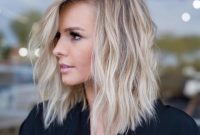Dandruff, a common scalp condition characterized by flaking and itching, affects individuals worldwide. While often considered a minor annoyance, it can be a persistent and embarrassing issue for many. Understanding the causes of dandruff is the first step towards effective management and prevention.
This comprehensive guide delves into the various factors that contribute to dandruff, ranging from scalp conditions and hygiene practices to dietary habits and underlying medical conditions.
From the role of Malassezia globosa, a fungus that thrives on scalp oils, to the impact of harsh shampoos and excessive heat styling, this exploration unveils the intricate relationship between scalp health and dandruff. Additionally, it examines the potential links between poor diet, stress, hormonal changes, and certain medications with the development of dandruff.
Scalp Conditions

Dandruff, a common scalp condition characterized by flaking and itching, can be caused by several underlying scalp conditions, including Malassezia globosa, seborrheic dermatitis, and psoriasis.
Malassezia Globosa
Malassezia globosa is a fungus that naturally resides on the scalp and feeds on scalp oils, releasing oleic acid as a byproduct. This oleic acid can irritate the scalp, leading to flaking and dandruff. Factors such as stress, hormonal changes, and a weakened immune system can contribute to an overgrowth of Malassezia globosa, exacerbating dandruff symptoms.
Seborrheic Dermatitis
Seborrheic dermatitis is a common scalp condition characterized by red, itchy, and flaky skin. It is caused by an overproduction of sebum, the scalp’s natural oil, which creates a favorable environment for Malassezia globosa to thrive. This overgrowth of Malassezia globosa triggers inflammation and irritation, resulting in dandruff.
Psoriasis
Psoriasis is an autoimmune condition that affects the skin, causing red, scaly patches on various body parts, including the scalp. When psoriasis affects the scalp, it can lead to dandruff-like symptoms, including flaking and itching. The exact cause of psoriasis is unknown, but it is thought to involve an overactive immune system that mistakenly attacks healthy skin cells, leading to rapid skin cell turnover and the formation of scales.
Hygiene and Hair Care Practices
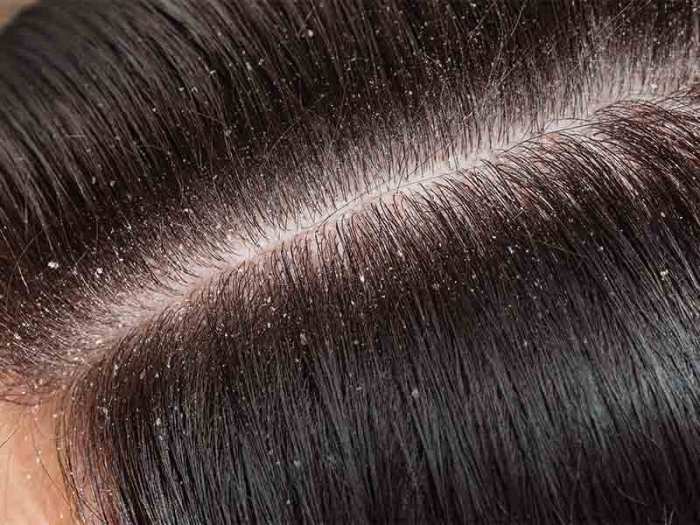
In addition to scalp conditions, hygiene and hair care practices can significantly influence the development of dandruff. Understanding the relationship between these factors and dandruff can help individuals adopt a more effective hair care routine to prevent or manage the condition.
Infrequent Shampooing
Infrequent shampooing is a common cause of dandruff. When you don’t wash your hair regularly, dead skin cells, oils, and product buildup accumulate on the scalp, creating a breeding ground for the Malassezia globosa fungus. This fungus feeds on the oils and produces oleic acid, a substance that irritates the scalp and causes flaking.
Harsh Shampoos and Styling Products
Harsh shampoos and styling products can strip the scalp of its natural oils, leaving it dry and prone to flaking. These products often contain harsh detergents that can irritate the scalp and disrupt its natural balance. Additionally, using styling products like gels, mousses, and sprays can leave behind residue that can clog hair follicles and contribute to dandruff.
Excessive Heat Styling
Excessive heat styling can also contribute to dandruff. When you use hot tools like hair dryers, curling irons, and flat irons on a regular basis, it can damage the scalp and hair, making it more susceptible to dryness and flaking.
Heat styling can also irritate the scalp, leading to inflammation and increased oil production, which can further exacerbate dandruff.
Dietary and Lifestyle Factors
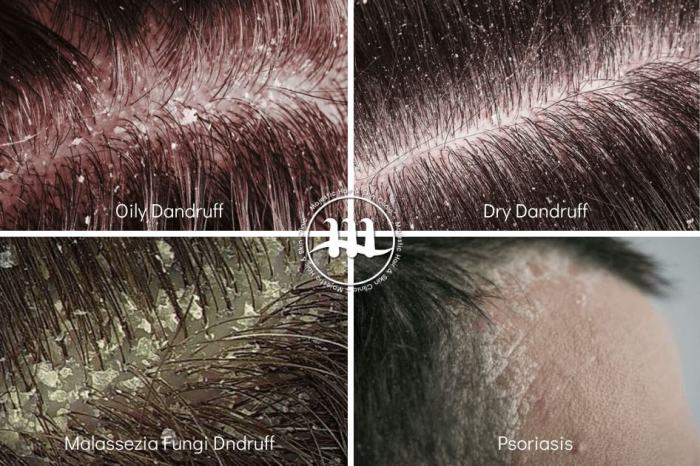
Dandruff can be influenced by a variety of dietary and lifestyle factors. Poor nutrition, stress, hormonal changes, and certain medications can all play a role in the development and severity of dandruff.
Nutritional Deficiencies
A diet lacking in certain vitamins and minerals can contribute to dandruff. For example, a deficiency in vitamin B6 (pyridoxine) has been linked to an increased risk of dandruff. Vitamin B6 is involved in the metabolism of amino acids, which are the building blocks of proteins.
A deficiency in this vitamin can lead to an overproduction of skin cells, including those on the scalp, which can contribute to dandruff.
Stress and Hormonal Changes
Stress and hormonal changes can also affect scalp health and increase the risk of dandruff. Stress can trigger the release of hormones that stimulate the sebaceous glands in the scalp to produce more oil. This excess oil can create a favorable environment for the growth of Malassezia, a fungus that is commonly found on the scalp and is associated with dandruff.
Hormonal changes, such as those that occur during puberty, pregnancy, and menopause, can also affect scalp health and increase the risk of dandruff. These hormonal changes can lead to an increase in sebum production, which can contribute to dandruff.
Medications
Certain medications, such as chemotherapy drugs, retinoids, and some antidepressants, can cause dandruff as a side effect. These medications can affect the scalp’s natural balance of oils and moisture, leading to dryness, irritation, and dandruff.
Medical Conditions and Allergies
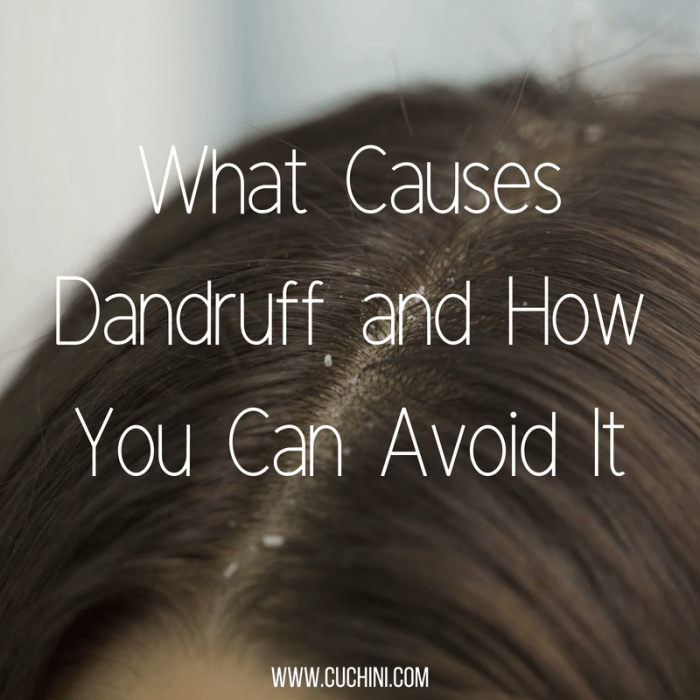
Dandruff can arise from underlying medical conditions and allergies. Understanding these connections can help individuals address the root causes and manage dandruff effectively.
HIV/AIDS and Parkinson’s Disease
Certain medical conditions, such as HIV/AIDS and Parkinson’s disease, can increase the risk of developing dandruff. In HIV/AIDS, weakened immunity compromises the scalp’s natural defenses, making it more susceptible to dandruff-causing microorganisms. In Parkinson’s disease, alterations in dopamine levels may affect scalp oil production, leading to dandruff.
Allergies
Allergies, particularly those related to scalp sensitivity, can trigger dandruff. Common allergens include certain hair care products, fragrances, and even certain foods. Identifying and avoiding these allergens can help reduce dandruff symptoms.
Medications
Some medications, such as certain antibiotics and anti-inflammatory drugs, can have dandruff as a side effect. These medications can alter scalp oil production or disrupt the scalp’s natural balance, leading to flaking and irritation.
Prevention and Treatment
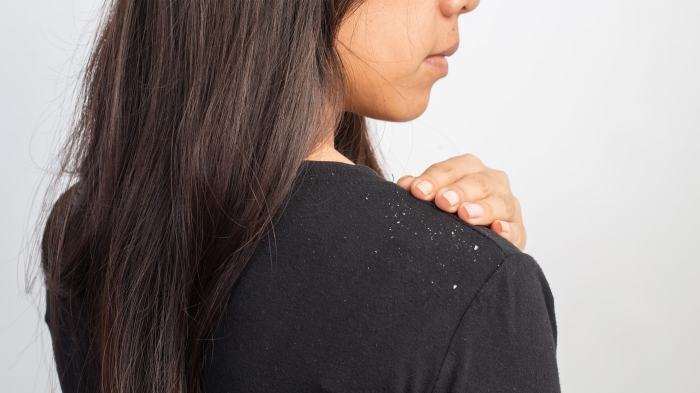
Managing dandruff requires a multi-pronged approach, encompassing preventive measures, home remedies, and medical treatments. This section delves into effective strategies to combat dandruff, offering guidance on preventing its occurrence and managing it effectively when it arises.
Preventive Measures
Adopting healthy scalp hygiene and hair care practices can significantly reduce the risk of dandruff. These preventive measures include:
- Regular Shampooing: Washing hair regularly with a mild shampoo helps remove excess oil, dirt, and product buildup, creating an unfavorable environment for dandruff-causing fungi.
- Avoiding Harsh Hair Care Products: Steer clear of harsh shampoos, styling products, and chemical treatments that can irritate the scalp and exacerbate dandruff.
- Managing Stress: Stress can trigger dandruff flare-ups. Practicing stress management techniques like exercise, meditation, or yoga can help alleviate stress and reduce the likelihood of dandruff.
Home Remedies
Simple home remedies can provide relief from mild dandruff. These natural approaches include:
- Apple Cider Vinegar Rinse: Dilute apple cider vinegar with equal parts water and apply it to the scalp. Leave it on for 15 minutes before rinsing thoroughly. Its antifungal properties may help combat dandruff.
- Baking Soda Scrub: Mix baking soda with water to form a paste. Massage this paste into the scalp and leave it on for 10 minutes before rinsing. Baking soda’s antifungal and exfoliating properties can help control dandruff.
- Tea Tree Oil Treatment: Add a few drops of tea tree oil to your regular shampoo or conditioner. Tea tree oil’s antifungal and anti-inflammatory properties may help alleviate dandruff symptoms.
Over-the-Counter Treatments
For more persistent dandruff, over-the-counter (OTC) treatments offer effective relief. These products typically contain active ingredients that target the underlying causes of dandruff, such as:
- Anti-fungal Shampoos: These shampoos contain ingredients like ketoconazole, selenium sulfide, or zinc pyrithione, which help combat the Malassezia fungus that contributes to dandruff.
- Salicylic Acid Shampoos: Salicylic acid helps exfoliate the scalp, removing dead skin cells and excess oil that can clog hair follicles and contribute to dandruff.
- Coal Tar Shampoos: Coal tar shampoos contain tar, which has anti-inflammatory and anti-itching properties, providing relief from dandruff-related scalp irritation.
Prescription Medications
In severe cases of dandruff that do not respond to OTC treatments, prescription medications may be necessary. These medications may include:
- Oral Antifungal Medications: Oral antifungal medications like fluconazole or itraconazole are prescribed for severe cases of dandruff caused by a fungal infection.
- Topical Corticosteroids: Topical corticosteroids are prescribed to reduce scalp inflammation and itching associated with dandruff.
Last Recap
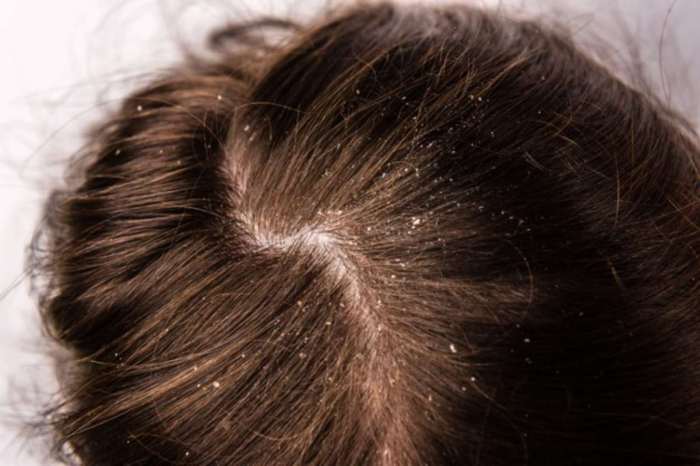
In conclusion, dandruff is a multifactorial condition influenced by a complex interplay of scalp conditions, hygiene practices, dietary factors, and underlying medical issues. Recognizing the diverse causes of dandruff empowers individuals to adopt targeted preventive measures and seek appropriate treatment options.
Whether through regular shampooing, avoiding harsh hair care products, managing stress, or consulting a healthcare professional, proactive steps can be taken to alleviate dandruff and promote scalp health.
Helpful Answers
What is the primary cause of dandruff?
The primary cause of dandruff is the overgrowth of Malassezia globosa, a fungus that feeds on scalp oils, leading to irritation and flaking.
How does infrequent shampooing contribute to dandruff?
Infrequent shampooing allows dead skin cells and oils to accumulate on the scalp, creating a favorable environment for Malassezia globosa to thrive and cause dandruff.
Can certain medications cause dandruff as a side effect?
Yes, some medications, such as corticosteroids and certain chemotherapy drugs, can disrupt scalp health and increase the risk of dandruff as a side effect.
What dietary factors can influence dandruff?
A diet deficient in certain vitamins and minerals, particularly B vitamins, zinc, and omega-3 fatty acids, can contribute to dandruff development.
How does stress affect dandruff?
Stress can exacerbate dandruff by stimulating the production of scalp oils, providing a suitable environment for Malassezia globosa to proliferate.


